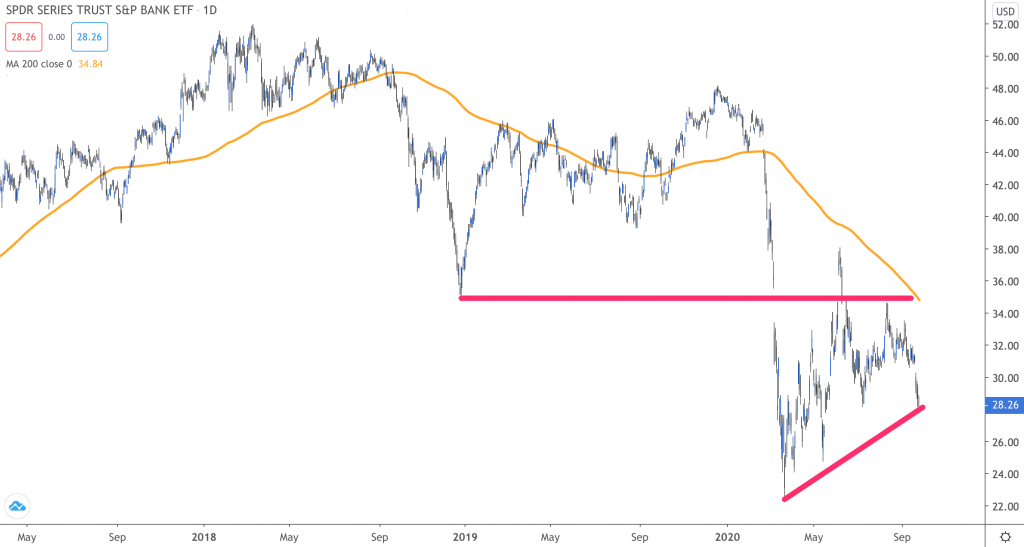While the banking sector took a hit this week after a report alleged international banks moved $2 trillion in illicit funds over the last two decades, 1 stock in the sector is investor’s best bet now.
Bank stocks took a hit this week following a new report from the International Consortium of Investigative Journalists that said global banks have moved allegedly illicit funds over the past two decades despite warnings from U.S. officials.
JPMorgan (NYSE: JPM), Deutsche Bank (NYSE: DB), and HSBC Holdings (NYSE: HSBC) were among the banks who “kept profiting from powerful and dangerous players,” according to the report which detailed more than $2 trillion in transactions between 1999 and 2017 that were flagged by financial institutions’ internal compliance officers as possible money laundering or other criminal activity.
“It’s the nature of banking: They move money,” said Jim Richards, former head of anti-money laundering at Wells Fargo (NYSE: WFC) and Bank of America (NYSE: BAC). “So despite all the efforts to crack down on this, there’ll always be some criminal money moving through the banking system. It’s [a] very small portion of the trillions of dollars they handle every day.”
Following the news, bank stocks have taken a tumble.
Bank of America shares are down -8% over the last week, Citigroup (NYSE: C) is down more than -7%, Deutsche Bank is down -12%, HSBC is down nearly -9%, JPMorgan shares are down -6%, and Wells Fargo is down -7%.
But there’s no love lost on banking stocks according to Oppenheimer’s Ari Wald
“This is just such a great example that when the macro turns and the market corrects, the weak get weaker,” Oppenheimer’s head of technical analysis said. “I can defend technology on this [week’s] pullback; I can’t defend the banks. They are breaking down from a much weaker structure.”
So far this year, the KBE S&P Bank ETF—which holds names including JPMorgan and Citigroup—is down just over -40%, while the broader financials sector is the second worst performing group in the S&P 500.
“This really exemplifies the difficult market backdrop investors, value investors in particular, have experienced in recent years,” Wald continued. “They peaked back in 2018, they’ve been in this massive multiyear decline since then. Now they are trying to base, and I do think that is still in play even with today’s pullback, but more is needed.”

BK Asset Management’s Boris Schlossberg echoed Wald’s negative sentiment on the group.
“The biggest story for banks right now, taking the money laundering issue aside, is simply the fact that the [Federal Reserve] is suppressing interest rates,” Schlossberg, BK Asset Management’s managing director of FX strategy, said. “Even though they’re not practicing yield-curve control, they are de facto creating yield-curve control, and it’s the fact that nominal rates are so flat that’s truly killing the banks.”
However, despite his pessimism on the group in general, Schlossberg said there’s one name in the bunch that stands out from the crowd.
“You see JPMorgan Chase outperforming the broader index and I still continue to think that that is the star amongst all of the banks, and if you’re going to sort of trade relative to that, then you’d be long JPMorgan against the whole index as a hedge,” Schlossberg said. “In my opinion, that’s probably your best bet given the situation right now.”
But not everyone on the Street is down on banking stocks.
In a note out on Thursday, Wells Fargo analyst Mike Mayo said that while, “There is a lack of short-term catalysts” for the sector, “for patient investors, this is a unique entry point.”
Mayo argues the current economic downturn is an “income statement recession and not a balance sheet recession,” meaning that banks can fund elevated loan-loss provisions from earnings and not impair their capital. “Book value is solid, and we think the third-quarter earnings reports will show book value growth.”
Mayo’s top picks in the space are JPMorgan, Bank of America, PNC Financial Services Group (NYSE: PNC), and U.S. Bancorp (NYSE: USB).
“Banks have some of the highest COVID beta in the market,” Mayo argued, referring to the sensitivity of bank stocks to developments on the coronavirus front. “It’s tough to call the exact time, but if you get a sector rotation into the banks, they could be up 10% to 20% in days.”